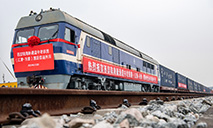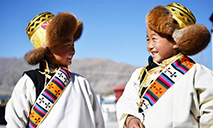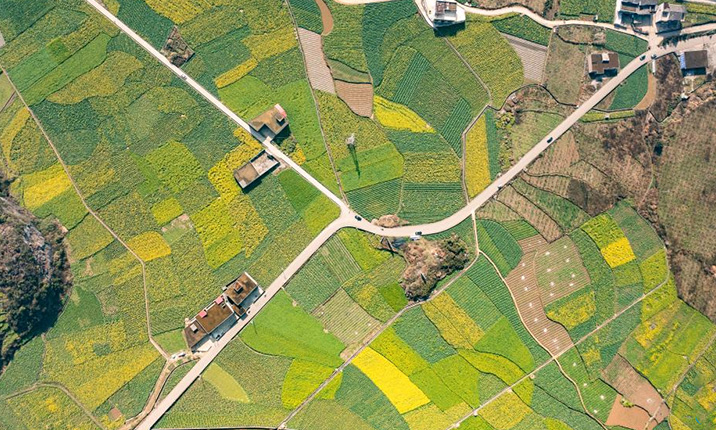Stories of different Tibetan women sharing name of goddess
LHASA, March 7 (Xinhua) -- "Drolma" is the name of a goddess in the Buddhist scripture, and is a popular name that many Tibetan parents pick for their newborns.
Although they share the same name, Drolmas in southwest China's Tibet Autonomous Region each have different stories that show the great changes that have taken place in the region over the past decades.
BORN IN A COWSHED
Dechen Drolma, 66, was given her name as her parents expected her to live a happy life with the goddess' blessing. However, she did not feel such blessings in her youth.
A former serf, Dechen Drolma was the fourth generation of her family that had been born in a cowshed in Khesum, a serf owner's manor in what is now the city of Shannan in Tibet.
In old Tibet, decrees stipulated that women were "the lowest level among the lowest-ranked people," and the price of a woman serf's life was equal to a straw rope.
As one of the 302 serfs in the manor, Dechen Drolma barely had enough to eat and was often beaten badly by her lord.
Things did not change until March 1959, when Khesum became the first village in Tibet to launch the democratic reform, liberating all serfs from feudal serfdom and abolishing the decrees.
"Gone were the days when I had to live in a cowshed," Dechen Drolma recalled, adding that her family was allocated with farmland, a house and livestock.
Since then, Dechen Drolma has embraced a bright new life. She went to school in the village, and like others, her family later bought a farming tractor. Her eldest daughter is now engaged in the transportation business and her two younger daughters have found jobs in the city proper of Shannan.
"Unlike me, my children no longer had to be born in a cowshed," said Dechen Drolma.
In 2017, all impoverished residents in Khesum were lifted out of poverty.
WITNESSING FIRST TRAIN IN TIBET
Sonam Drolma, 41, has been working at the Lhasa railway station for 16 years.
As a first-generation Tibetan railway worker in the region, she witnessed the arrival of the very first train in Tibet when the Qinghai-Tibet Railway was put into operation in 2006.
Born in a valley in eastern Tibet, Sonam Drolma remembers how difficult transportation was when she was young. It took her four days to get to her primary school, three days of walking followed by another day traveling by truck. Once she got to junior high, it took her more than 10 days to get to school in central China's Hunan Province.
Construction of the Qinghai-Tibet Railway section connecting Lhasa and Golmud started in 2001. When she learned that the Southwest Jiaotong University was recruiting students from Tibet to prepare for the railway line's operation, Sonam Drolma sent in her application immediately.
"I wanted to see the train reaching my hometown when I graduated," she said.
Now, railway lines have connected Lhasa, Nyingchi and Xigaze in the plateau region. The 435-km Lhasa-Nyingchi railway, the first electrified railroad operating in Tibet that opened in June 2021, had handled 621,000 passenger trips and carried over 7,900 tonnes of cargo by the end of 2021.
At the Lhasa station, Sonam Drolma saw more students leaving home for school or university. "I envy them very much for the better traffic conditions now. Watching them going to faraway places, I feel that my work is important," she said.
COURAGE TO PURSUE DREAMS
When Losang Drolma told her mother that she decided to become a model, they had a big quarrel. Though she majored in law at university, she was so into modeling that she borrowed money to pay for the training.
"My mother once thought walking on a stage was not a decent job," said Losang Drolma, 30.
With her efforts, Losang Drolma succeeded in her modeling career and ranked fourth in China in an international model contest in 2011.
She started a children's modeling and aesthetic training institution in 2016. Over the years, her students have stepped onto stages and runways during various fashion weeks.
"I'm lucky that I can do something that I'm passionate about. I hope my students can also find their passion," Losang Drolma said.
From 2016 to 2020, the number of market entities in Tibet more than doubled to 365,000, official figures show. A more open and inclusive social environment has also enabled more women to feel free to pursue their dreams.
Losang Drolma later found out that her award certificate was placed in a prominent area of her home by her mother.
"My name is Drolma. The name represents a group of women with energy. I hope more young people have the courage to pursue their dreams," said Losang Drolma.
Photos
Related Stories
Copyright © 2022 People's Daily Online. All Rights Reserved.










